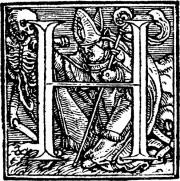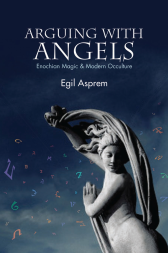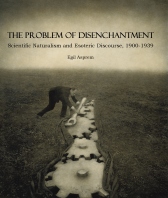The way things have turned out, the content of my PhD dissertation will revolve around a concept which Max Weber somewhat unsystematically formulated almost 100 years ago: the disenchantment of the world. Disenchantment has usually been described as a socio-cultural process, driven by rationalisation and intellectualisation processes which Weber traced back to the invention of monotheism, and the development of monotheistic theology. It has been embraced by sociologists and historians of religion in particular, who have seen in it (as did Weber) certain consequences for the condition of religion, magic, and their relation to intellectual life (and particularly science) in the modern world. My dissertation is increasingly becoming a criticism of the concept of disenchantment, and an exploration of a more nuanced approach to it as it relates to interfaces between religion, science, and that vast unsystematic and poorly defined set of “the occult”, “esoteric”, and “magical”. In April I had two opportunities to discuss these ideas in workshop settings, first with a commentary from the social historian of knowledge Peter Burke, and later in a research workshop for cultural history PhDs in the Netherlands called the Barchem symposium. In this post, and in two following installments, I will share the text of my lecture(s), intended to give an overview of my general approach, illustrated with snapshots of relevant cases from early 20th century history of science and culture. This first post discusses, historicises and criticises Weber’s concept of disenchantment in what is a brief theoretical introduction proposing that we take a different approach to it. Part two will concern the place of this revised notion in early 20th century scientific discourses, particularly in their broader cultural reception and context. The third part discusses briefly the attempt to create a “new natural theology” in this period.
Blind spots of disenchantment
Science, psychical research, and natural theology in the early 20th century
(Lecture given to a workshop with Peter Burke, April 5 2011, and to the Barchem Symposium, April 11 2011, both organised by the Huizinga Instituut)
Egil Asprem
The disenchantment of the world and the intellectual sacrifice
Max Weber’s thesis on disenchantment (Entzauberung) has been central for historians and social theorists analysing the fate of religion and ‘magic’ in the modern world. According to Weber, the ‘fate of our times’ is ‘the disenchantment of the world’, by which he meant the dissipation of ‘mysterious incalculable forces’ from the workings of nature.[1] An ‘intellectualist rationalism’ promoted first and foremost by the growing ‘empirical sciences’ had shifted people’s epistemic attitude to the world, now holding that any phenomenon is knowable in principle, and that knowledge and mastery of the world is obtainable through ‘technical means and calculations’.[2]
The disenchantment of the world had very specific consequences for the relation between religion and science. In another evocative phrase, Weber stated that those who sought to possess ‘genuine’ religion in a disenchanted world were forced to undergo an ‘intellectual sacrifice’ (Opfer des Intellekts); he saw ‘[r]edemption from the rationalism and intellectualism of science’ as ‘the fundamental presupposition of living in union with the divine’.[3] This meant that there could be no legitimate ground in between the two separate spheres, and no overlaps. Indeed, those intellectuals who refused to undergo the sacrifice, but instead wanted to reconcile their intellectualism with some sense of religion were dismissed as ‘swindlers or self-deceivers’.[4]
In terms of the classic trichotomy of ‘religion, magic, science’, Entzauberung primarily meant that ‘magic’ had to go.[5] ‘Magic’, however, is a highly problematic category which, historically, has been tied to polemical struggles to define both ‘correct’ religion and ‘correct’ science, variously disenfranchising, delegitimizing or outright demonizing deviances.[6] I argue that this basic structure remains at work in Weber’s notion of disenchantment and the related call for an intellectual sacrifice. As defined in his 1918 lecture, ‘Wissenschaft als Beruf’, disenchantment creates certain blind spots for the history of religion and the history of science. These do not only hide, but also delegitimize, some very significant cultural developments in Weber’s own days. Weber’s formulation of disenchantment should be seen as an active speech-act located in ongoing struggles to define how science and religion ought to be conducted, and what place these socio-cultural systems and practices should have in a modern society. Moreover, I shall argue that Weber’s (not always implicit) ‘oughts’ differed from the ‘ares’ of his time. In order to illustrate this, I will first have to introduce the notion of disenchantment a bit further. Particularly, I will draw attention to how it assumes some rather specific views on the philosophy of science, views which do not necessarily correspond with the actual form and practice of science. They belong to normative epistemology rather than the analytic-descriptive study of scientific practice. The next step is to light up the ‘blind spot’, zooming in on some of those cases which defied the intellectual demands of the disenchantment process. In doing this, I will also suggest a way in which disenchantment might be redefined to adequately address these cases.
Philosophical implications of disenchantment
Considering the underlying philosophical assumptions of disenchantment, there are primarily two points that should be mentioned. The first is epistemic optimism about gaining knowledge of the physical world. The second is scepticism concerning knowledge of meaning and value, as well as of metaphysics. These twin points govern the ideal relationship between science and religion in a disenchanted world.
The principal meaning of the disenchantment of the world was the dissipation of ‘mysterious incalculable forces’. As a matter of principle modern ‘empirical science’ has expelled the possibility of genuinely capricious events. This is the basis of the epistemic optimism: since no essentially unpredictable causal forces exist in the world, everything can be explained, determined and mastered by calculations and technological interventions. Uncovering the mechanisms of nature in this way is the business of ‘empirical science’.
Counterbalancing this optimism, the second point puts clear limitations on the scope of scientific knowledge. Two kinds of limitations are imposed. The first follows the fact/value distinction and may be termed ‘ethical’: with the world disenchanted, science can know facts of the world, but there is no meaning inherent in those facts which can tell anything about how to live one’s life. The second limitation concerns a separation of ‘empirical science’ from metaphysics. Taken together, there is a clear separation of science and ‘worldviews’ (Weltanschauungen). The determination of worldviews is not within the range of science, according to Weber. Worldviews are adopted privately and individually; discussing them critically is the business of philosophy and religion, which are governed by different sets of rules and assumptions than science.
Demarcations along these lines were not uncommon in the early 20th century.[7] They reflect a general anti-metaphysical tendency in the philosophy of science. Ernst Mach was a strong contemporary proponent of this tendency, for example, as were the influential logical positivist or empiricist currents which he helped inspire. In Weber’s case it also reflects a specifically neo-Kantian approach to ethics, epistemology, and religion: Weber’s predilection for the fact/value distinction, the scepticism of metaphysics, and the privatized autonomy of faith as a principle for religion were all inspired by neo-Kantian philosophy.[8] From the perspective of intellectual history, Weber’s reflection on the on disenchantment simultaneously presented one particular view on the ‘ideal’ operation of science and religion, as well as their demarcation. This view was furthermore uttered in the context where science’s identity was still uncertain, and its precise location in modern society and relation to other societal systems were not fixed. By relocating Weber as a participant in these debates rather than a detached and objective observer, the intellectual historian should be forced to ask: To what extent did intellectual spokespersons in scientific and religious communities themselves share Weber’s assumptions?
I will soon venture to show that there was considerable disagreement over some fundamental assumptions of disenchantment. This suggests to me that a major problem with disenchantment is its status as an irrevocable process. Instead of viewing the disenchantment of the world as a process, I propose to reconsider it as a cluster of intellectual problems. The ‘problem of disenchantment’ thus covers a set of quite straight-forward questions: are there incalculable forces in nature, or are there not? How far extended are the boundaries of our capabilities for acquiring knowledge? Is there, or can there be, a basis for morality, value, meaning, or theology in nature itself? Can ‘religious’ worldviews be extrapolated from natural facts? In short: all the features of Weber’s disenchanted world, with question marks added.
Analysing intellectual discourses with a methodological focus on how these questions are grappled with may open up for more nuanced perspectives on modern scientific and religious history. In the following I will chart out a few regions I find important in this general territory. First I will have a brief look at the place of disenchantment in some of the natural sciences of the early 20thcentury. Then I will move on to consider links to the much more controversial but nevertheless very popular discipline of psychical research. Finally, I conclude with some reflections on the emergence of a new ‘natural theology’ in this period.
(end of part 1/3; view 2/3; view 3/3)
[1] Weber, ‘Science as a Vocation’, 155.
[2] Ibid., 139
[3] Ibid., 155. Cf. the German original: Weber, ‘Wissenschaft als Beruf’, 510-511.
[4] Literally, he accused them of being engaged in ‘Schwindel oder Selbstbetrug’. Weber, ‘Wissenschaft als Beruf’, 509.
[5] Indeed, ‘demagification’ might be a more accurate translation of this term than ‘disenchantment’.
[6] See e.g. Randall Styers, Making Magic; Marco Pasi, ‘Magic’.
[7] For a contextualisation of Weber’s thought on these issues, see Patrick Dassen, De onttovering van de wereld, 228-312.
[8] Mainly through his good friend, the philosopher Heinrich Rickert. Dassen, De onttovering van de wereld, 255. For Rickert and his place within contemporary struggles in the philosophy of science (particularly the humanities and the social sciences), see Charles R. Bambach, Heidegger, Dilthey, and the Crisis of Historicism, esp. 83-126.

This work by Egil Asprem was first published on Heterodoxology. It is licensed under a Creative Commons Attribution-ShareAlike 3.0 Unported License.







[…] up the previous post about Weber’s notion of disenchantment, and its normative implications, this second part of […]
[…] 1/3 – […]
[…] you are exceptionally eager to know what I might have to say about this, why not check out some previous posts on disenchantment, psychical research, or the relation between science and […]